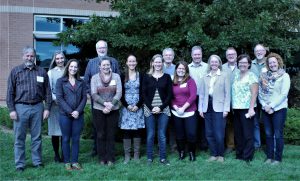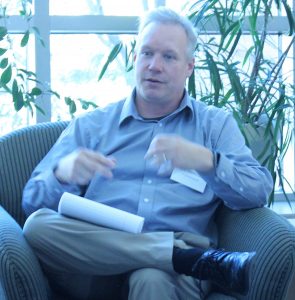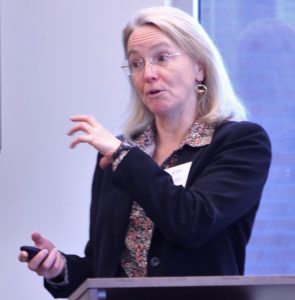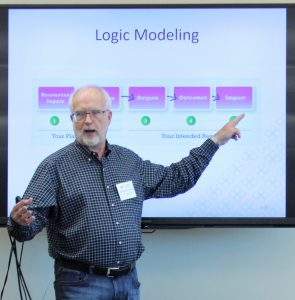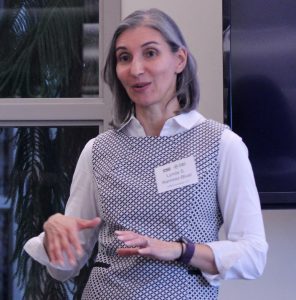Over the past 5 years, our Sustaining Biological Infrastructure program has trained 162 leaders with skills to develop and run successful projects and programs. In October, 2018, we headed to Fort Collins CO with our newest version of the course, and left with great connections, memories, and lessons learned.
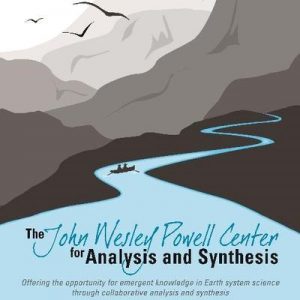
Fort Collins, Colorado, a city known for its vibrant music scene, local breweries, and outdoor enthusiasts, lies at the base of the Rocky Mountains just an hour north of Denver. It also supports a vibrant research community that includes the Unites States Geological Survey’s Fort Collins Science Center. Nestled within the center is the John Wesley Powell Center for Analysis and Synthesis, a scientist driven institution which provides a space for innovation and collaboration between scientists and managers. Having hosted groups working on natural resource management, climate change, and ecosystem services; we knew it would be a great location for our course, which brings together leaders of field stations, research centers, laboratories, and natural history collections.
Scientists leading biological infrastructure projects often lack formal training in accounting, finances, business management, and communication. In a world where funding is highly competitive, stakeholders are often diverse, and marketing is confusing, we strive to equip these scientists with the skills and tools to make their projects more sustainable and successful in the long term. The Ecological Society of America’s 3-day Sustaining Biological Infrastructure (SBI) course does just that: it’s designed to help scientists build these skills in an interactive, engaging, and fun setting—and with meaningful takeaways.
Serving as mentors over the course of the workshop, our instructors bring decades of experience and a wealth of knowledge on topics ranging from accounting, strategic planning, business management, marketing, and communications. Although lecture is part of the learning, the course is also very interactive and is shaped by unique class discussions, breakout groups, and partner work. We create a safe environment to foster the open sharing of ideas, feedback, and constructive criticism that help attendees to grow as part of a community and as individuals.
Our Fort Collins course brought together 9 leaders of programs spanning the United States (and globe!) from Massachusetts to the Marianas Islands – leaders of marine labs, botanical gardens, mountain research stations, and bird conservation research. The diversity in 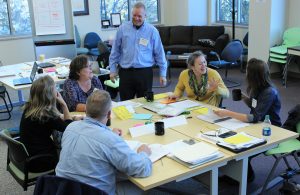 project type, location, and age- with our youngest projects in the early stages of development to our oldest project at 43 years old- allow a broad range of knowledge and experiences to be shared between colleagues. This group aspired to develop sustainable and effective organizational structure, learn effective strategies for funding, and establish financial independence. Identifying specific goals through pre-course surveys helps our instructors tailor the course to each group, and directly address those goals through case studies, business model and analysis activities, and the culminating exercise: developing a pitch. Overall- the experience and connections that were made through lots of laughter,
project type, location, and age- with our youngest projects in the early stages of development to our oldest project at 43 years old- allow a broad range of knowledge and experiences to be shared between colleagues. This group aspired to develop sustainable and effective organizational structure, learn effective strategies for funding, and establish financial independence. Identifying specific goals through pre-course surveys helps our instructors tailor the course to each group, and directly address those goals through case studies, business model and analysis activities, and the culminating exercise: developing a pitch. Overall- the experience and connections that were made through lots of laughter,
Following up with SBI alumni is always uplifting, as is hearing stories about the 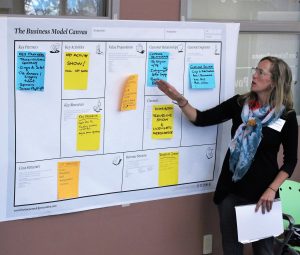 work they have completed using skills developed in the course. From alumni surveys, we have found that 98% gained knowledge and skills that will make a meaningful impact on their project within the next 6-12 months, and 95% will recommend the course to a colleague! However, survey results only tell part of the story, and the anecdotes and ideas that come directly from our alumni are the most motivational for us as we continue planning for the future of SBI.
work they have completed using skills developed in the course. From alumni surveys, we have found that 98% gained knowledge and skills that will make a meaningful impact on their project within the next 6-12 months, and 95% will recommend the course to a colleague! However, survey results only tell part of the story, and the anecdotes and ideas that come directly from our alumni are the most motivational for us as we continue planning for the future of SBI.
“The resources–the logic model, the things we’ve learned, everything Lynda had to lecture on, can help me to do my job more effectively. Thinking about and practicing “the pitch” one way or another will help as we move forward to diversifying our support out of government grants and into individual or foundation asks.”
“I am excited to use many of the tools to help support our overall objectives. I plan to utilize the workbook to help facilitate projects for my team and how to better direct our work. I hope to have greater success with grants and pitches using the feedback [received in the course].”
“These are topics I have been wanting to spend time on since I started my job. A 3-day immersion was just what I needed. Having a colleague there was doubly valuable.”
The 3-day Sustaining Biological Infrastructure course happens twice each year, but we also present short versions at various societal meetings and conferences. Are you interested in joining a course or getting involved? Please send an email to Jill and Emily at and visit esa.org/sbi to learn more about the course, including future dates. We’d love to hear from you, and to meet you in the future!
